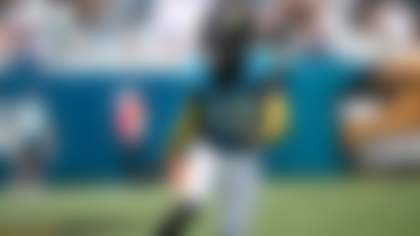(Note: The following story appears in the Super Bowl XLII Official Program.)
Guess what helped Doug Williams roll into that trampling spell 20 years ago in Super Bowl XXII?
Go ahead, make any sense of the day before, the night before, how he prepared for that marvelous game, especially that mind-blowing second quarter, when he rose and delivered a world championship for the Washington Redskins and a cultural exam for America.
"I didn't even practice the day before the game," Williams recalls. "I had a root canal. I went to a La Jolla (Calif.) dentist."
A root canal?
That helped settle him, he says, after a week of practice that was "the greatest" he ever had.
Just getting a shot to play that season, when Redskins starter Jay Schroeder grew cold and injured late in the year, was a surprise for Williams. Yet it paved a path to his big game and the big quarter. That four-touchdown pass, 35-point second quarter that Williams orchestrated. The one that Washington rode to a 42-10 victory over the Broncos at San Diego's Jack Murphy Stadium.
So, a trip to the dentist the day before. How about the night before?
"I ate a bag full of Hershey's Kisses," Williams says. "Just watched TV and enjoyed the candy. It became a ritual for me before big games."
Both were part of Williams' game plan for Super Bowl XXII. They led to a performance so good, its memory has survived all these years and continues to make Redskins fans giddy every time they see the highlights. Whether it was "Charlie 10 Hitch," "Scram 7," or "Scram H Corner," Williams and his receivers kept connecting and kept scoring.
Finally, an African-American quarterback had played in a Super Bowl. And he won it. That scrutiny was a burden for Williams entering the game. Now, 20 years later —- and mission accomplished -— it is not a burden but a badge he has worn nobly.
"I can close my eyes and see it all like it was yesterday," Williams says. "After we did it, late in the fourth quarter, I put my hands in my front pockets. It was announced that I was MVP. Everyone came up and tapped me on the head. Every memory -- from the time I first picked up a football until that very moment -- was flashing before me. A Rolodex. A kaleidoscope. The journey passed before me in an instant.
"It just wasn't supposed to be carved out for a black man to do this. The Ku Klux Klan used to ride up and down the street in my hometown of Zachary, Louisiana. But that Super Bowl happened to me. And it makes me think of what Martin Luther King said: 'I've been to the mountain top…I've seen over onto the other side.'
"I was there. For four quarters and especially for that second quarter, I was there. Yesterday didn't matter. Tomorrow, I was not going to worry about it. I was there. For that moment, right then, I was there."
These days he is in Tampa Bay, working with the Buccaneers as a personnel executive, back in the city where his NFL journey began in 1978 after being a first-round selection out of Grambling State. People thank him for coming back. They thank him for joining the community. When he travels, people recognize him. They remember.
"In airports, young people will come up and say, 'You're the guy my mom was praying so hard for,' or an older person will tell me, 'Son, I know nothing about football, but I was praying for you on that day.'
"It's black fans; it's white fans," Williams says. "You can't buy that. It's priceless."
Some of his fans now play for the Redskins.
"Jason Campbell, the young Washington quarterback, called me when he was drafted to ask if he could wear my number 17. What a great feeling. That game has brought many great feelings over the years."
As is so often the case with these kinds of stories, it almost never happened. Redskins head coach Joe Gibbs had negotiated a trade early on in 1987 that would have sent Williams to Oakland. Williams was happy -- he'd get to start and, truth be told, he always had an affinity for the "silver and black." He even let his family and friends in on the news.
But the next morning, Gibbs changed his mind, explaining to a now angry Williams, "Douglas, I just have a feeling somewhere this season you're going to come in here and we're going to win this thing."
Williams appeared in five games during the regular season, helping the Redskins —- runaway winners in the NFC East-— to finish 11-4.
While the 49ers had gone 13-2 and held home-field advantage for the conference playoffs, the plot-line changed when they lost to the Vikings, while the Redskins went on the road and beat Chicago in Walter Payton's final game. That sent the NFC title game to the nation's capitol, where Williams and his team toppled Minnesota, 17-10, for the conference crown.
But early on in Super Bowl XXII, things did not look promising. Denver had scored the first 10 points and Williams was hurt, injuring his knee while being tackled. It was a twisting, turning, nasty pretzel-looking injury.
"The trainers came on the field," Williams recalls. "I motioned to the trainer with my hand first. Then I told him, 'Don't touch me.' I knew if I could get up on my own, I was going to finish this game. As long as I could stand without help, I would be all right."
Gibbs was initially concerned.
"I thought he was done," recalls the coach. "But (Doug) came to the sideline for a play and had that look in his eye that said, 'I'm not coming out of here.'"
With his team trailing and in trouble, there was Williams --injured knee and all -- jogging back onto the field and about to embark on the greatest quarter in Super Bowl history.
"I've never seen a quarter like that before," says Gibbs. "It maybe happens once in a lifetime in coaching. Every play we called probably averaged eight yards. You just don't have that."
Williams started the onslaught by hitting Ricky Sanders for an 80-yard touchdown, then followed with a 27-yard scoring throw to Gary Clark that put Washington in the lead. After Timmy Smith's 50-yard TD run, Williams connected with Sanders a second time and then threw a final strike to Clint Didier just before halftime. Five touchdowns on five straight possessions. And the whole thing took all of 18 plays.
By the time it was over, the Redskins had not only scored the most points in one half in Super Bowl history, they had accomplished it in one quarter. Their 602 total yards for the game also set a Super Bowl mark.
Williams says the whole "black quarterback" subject was never an issue for the team. It was more important and a distraction to the rest of the world, he said, adding that his teammates understood the hype. Williams says they also knew this: He gave them the best chance to win. For his teammates, that was more than enough.
"After it was all over," says Anthony Jones, Williams' roommate for that game and now the head coach at Alabama A&M, "Doug bought the offensive line and tight ends commemorative watches. It was very nice. When you're a part of history, you don't necessarily realize it [at first]. Then you talk, appreciate, and learn to relish.
"It was a blessing to be with him the night before, to talk and share history. I don't take that for granted. Over the years, I have relished it even more."
So have Steve McNair and Donovan McNabb, black quarterbacks who have played in the Super Bowl since Williams. So have Tony Dungy and Lovie Smith, who last year made history as the first black head coaches to reach the Super Bowl. And so have football fans of all races who saw in Williams what Gibbs saw.
"One of the things I always admired about Doug was his great leadership," Gibbs says. "The players really responded and looked up to him.
"He was also very relaxed. I've often told the story when we were getting ready for a playoff game, and I turned to my side and saw Doug yawning. He belonged on the big stage."
Once the ring was won and the locker room celebration complete, Williams returned to the team hotel with his family. His knee was too sore to stand, but that didn't lessen the excitement or satisfaction. He describes it as "moments of sunshine during the middle of the night."
The TV commercials and endorsements -- normal for most Super Bowl-winning quarterbacks, particularly MVPs -- did not come for him. He learned to accept that gracefully, though for years it hurt deeply. Williams has too many magical memories to let anything steal his joy.
He thinks back to then-Redskins owner Jack Kent Cooke and the "Way to go!" salute Cooke offered him after the Super Bowl victory was complete. He thinks of his father, Robert, who died in 1989 at age 67, who had lived in a wheelchair and demanded of his son to always finish what he started. And he thinks of his mother, Laura, now 78, who always took the bus instead of a plane -- "No baby, I got time," she would insist -- and who still reminds Williams now of her pride in him.
Williams remembers the victory parade in Washington, D.C., how the city coalesced, how politicians threw aside their biases, and how color -- even if it was just for a few hours -- did not matter. It makes him shiver. Even now, when he sees a championship game, he says chills run down his back. He has been down that road, up that mountain. He has seen the other side.
Doug Williams will watch Super Bowl XLII and more chills will come. And like a Rolodex, like a kaleidoscope, so will the memories.
"Sometimes I feel bad that I got all the glory," says Williams, who played two more seasons before retiring at age 34. "The historical impact…they were all part of it -- teammates, family, and friends.
"Every day I think about some part of the story," he adds. "It has gone by so fast; it seems like yesterday.
"When I get up and jog at 5 a.m., a whole lot goes through my mind. No one else is out there but me. But I don't feel alone."
Thomas George is NFL Network managing editor. He is a former Denver Post, New York Times and Detroit Free Press writer/columnist.



